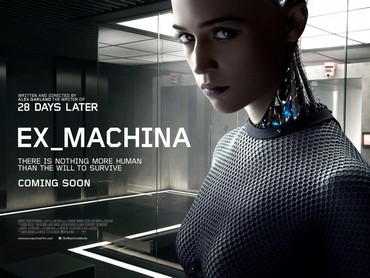Sunday, May 3, 2015
Ex Machina review
It can be a tricky thing when a screenwriter finally decides to direct his own script. Think Dustin Lance Black1, Charlie Kaufman, William Monahan2. Now Kaufman's "Synecdoche, New York" definitely has its champions, but the film largely flopped and we haven't had anything from Kaufman since. Point is, just because you're a compelling screenwriter, it does not necessarily mean you'll be a compelling director. Some can pull it off like Tony and Dan Gilroy or (and this is going further back in time) Paul Schrader. But, overall, you're never quite sure what you're going to get from a screenwriter-turned-director.
What struck me about "Ex Machina" was how director Alex Garland was able it look so visually compelling. Nathan Bateman, played by Oscar Isaac, lives completely isolated while he does his work. The film is told through the eyes of Caleb, Domhnall Gleeson, a programmer who wins a contest to visit his boss in this large, isolated home.
There's the big panoramic glass windows, the crisp, white hallways... Nathan's home is as welcoming as it is suffocating. And especially when you find out the only way to navigate your way through Nathan's home is by having a personalized keycard (which only gives you access to certain doors), there's an immediate sense of feeling trapped.
I love how Garland is able to tell a large portion of this story visually and it's a talent that not all screenwriter-turned-directors have, especially for a directorial debut. Before this, Garland was known for penning the screenplays to "28 Days Later" and "Sunshine," but it seems he really saved his best work for himself. "Ex Machina" delivers on all fronts: from its visuals to its characters to the story.
Nathan invited Caleb to his home because he wants Caleb to test his newly-created A.I., Ava. Ava is a humanoid robot and Nathan's goal was to program her to be as human as possible. But Ava is trapped in Nathan's already claustrophobic home. She's not trusting of Nathan and once Caleb enters the picture, she looks to him as, hopefully, a means to escape.
But really, the movie goes far beyond its initial premise to give us something completely captivating and unsettling. While "Ex Machina" has some clear sci-fi elements, this is really a character piece. It's about how Caleb and Nathan view women. It's about the ethics involved in testing a humanoid robot that has all the features and abilities of a human. If you create something that's as close to human as possible, is it wrong to not treat it like a human?
And while Garland has been known for penning scripts with out-of-nowhere left turns in the third act, "Ex Machina" never loses itself when the plot advances. It's relentlessly thrilling from beginning to end and it closes on a note that I'm still unable to shake off even though it's been weeks since I've seen the movie. I keep thinking about what's going to happen to these characters after the movie ends, as if I'm 12 years old all over again. The movie ends on a perfect note, but it leaves you wanting more in the best way. "Ex Machina" is a film that I'll be thinking about for a long time.
Grade: A
1 Dustin Lance Black won the "best original screenplay" Oscar for "Milk," then wrote/directed "Virginia" which was a huge critical flop.
2 William Monahan won "best adapted screenplay" Oscar for "The Departed," then wrote/directed "London Boulevard" to lackluster reviews and little fanfare.
Subscribe to:
Post Comments (Atom)

No comments:
Post a Comment